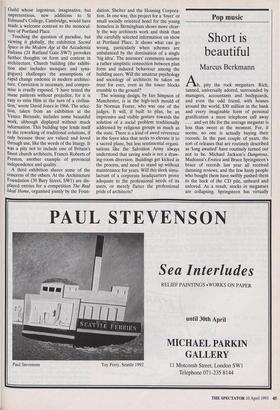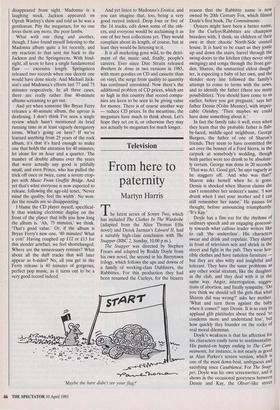Pop music
Short is beautiful
Marcus Berkmann
pity the rock megastars. Rich, tanned, universally adored, surrounded by managers, accountants and bodyguards, and even the odd friend, with houses around the world, $30 million in the bank and every imaginable form of personal gratification a mere telephone call away . . . and yet life for the average megastar is less than sweet at the moment. For, it seems, no one is actually buying their records. In the past couple of years, the sort of releases that are routinely described as 'long awaited' have routinely turned out not to be. Michael Jackson's Dangerous, Madonna's Erotica and Bruce Springsteen's brace of records last year all received damning reviews, and the few hasty people who bought them have swiftly pushed them to the back of the CD pile, unheard and unloved. As a result, stocks in megastars are collapsing. Springsteen has virtually disappeared from sight. Madonna is a laughing stock. Jackson appeared on Oprah Winfrey's show and told us he was a gentleman. Pity the megastars, for no one loves them any more, the poor lambs.
What with one thing and another, though, I have found myself listening to the Madonna album quite a lot recently, and my reaction to that sent me back to the Jackson and the Springsteens. With hind- sight, all seem to have a single fundamental flaw — excessive length. Springsteen released two records when one decent one would have done nicely. And Michael Jack- son's and Madonna's efforts last 77 and 75 minutes respectively. In all three cases, there are really rather fine 40-minute albums screaming to get out.
And yet when someone like Bryan Ferry releases a 40-minute album, the uproar is deafening. I don't think I've seen a single review which hasn't mentioned its brief running time in at least vaguely derogatory terms. What's going on here? If we've learned anything from 25 years of the rock album, it's that it's hard enough to make one that holds the attention for 40 minutes, let alone for an hour and a quarter. The number of double albums over the years that were actually any good is pitifully small, and even Prince, who has pulled the trick off once or twice, came a severe crop- per with Music From Graffiti Bridge. And yet that's what everyone is now expected to release, following the age-old tenet, 'Never mind the quality, feel the width'. No won- der the results are so disappointing.
I blame the CD player myself, specifical- ly that winking electronic display on the front of the player that tells you how long the album is. 'Au, 75 minutes,' we think. 'That's good value.' Or, if the album is Bryan Ferry's new one, '40 minutes! What a con!' Having coughed up f12 or £13 for this slender artefact, we feel shortchanged. Where are the unnecessary remixes? What about all the duff tracks that will later appear as b-sides? No, all you get in the Ferry release is 40 minutes of gorgeous, perfect pop music, as it turns out to be a very good record indeed. And yet listen to Madonna's Erotica, and you can imagine that, too, being a very good record indeed. Drop four or five of the 14 tracks, edit down some of the oth- ers, and everyone would be acclaiming it as one of her best collections yet. They would complain about its length, of course, but at least they would be listening to it.
It is all marketing gone wild, to the detri- ment of the music and, finally, people's careers. Ever since Dire Straits released Brothers In Arms in two versions in 1985, with more goodies on CD and cassette than on vinyl, the surge from quality to quantity has continued unresisted. Now there's the additional problem of CD prices, which are so high in this country that record compa- nies are keen to be seen to be giving value for money. There is of course another way — reduce CD prices. In the meantime, the megastars have much to think about. Let's hope they act on it, or otherwise they may not actually be megastars for much longer.



























































 Previous page
Previous page